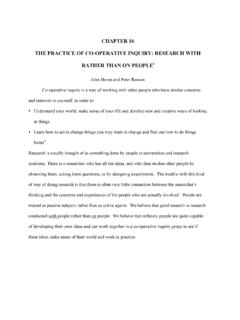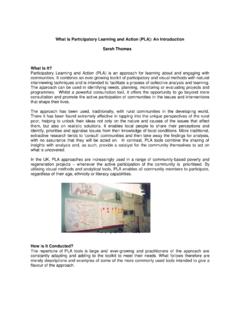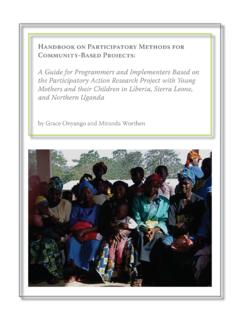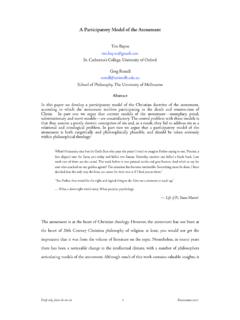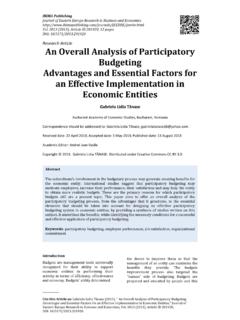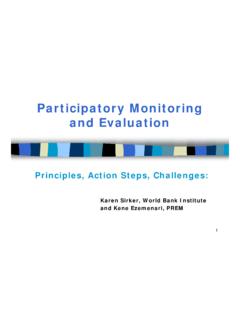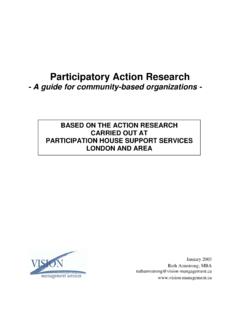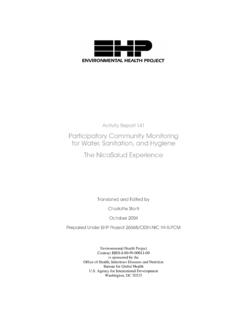Transcription of A PARTICIPATORY INQUIRY PARADIGM - Peter …
1 A PARTICIPATORY INQUIRY PARADIGMH eron, J., & Reason, P. (1997). A PARTICIPATORY INQUIRY PARADIGM . QualitativeInquiry, 3(3), HeronPodere GelloSan Cipriano56048 Volterra (Pi)ItalyPeter ReasonCentre for Action Research in Professional PracticeSchool of ManagementUniversity of BathOctober 1996 AbstractThis paper starts with a critique of Guba and Lincoln's (1994) outline of competingparadigms for research, in particular arguing that the constructivist position fails toaccount for experiential knowing. The arguments for a PARTICIPATORY worldview arearticulated based on a subjective-objective ontology; an extended epistemology ofexperiential, presentational, propositional and practical ways of knowing; amethodology based on co-operative relations between co-researchers; and an axiologywhich affirms the primary value of practical knowing in the service of ' noteThe authors wish to thank Yvonna Lincoln and the anonymous QI reviewer for theirhelpful notion of a PARADIGM or worldview as an overarching framework which organizes our wholeapproach to being in the world has become commonplace since Kuhn published The Structure ofScientific Revolutions in 1962.
2 In contrast to the view that a PARADIGM is, by its very nature, beyonddefinition and the grasp of the human mind, we believe that the mind, by its very nature, is moreextensive than any worldview on which it takes its current cognitive stance. Hence it is possible andessential to expand our awareness to articulate any fundamental way in which we frame our world, fordifferences of epistemology, methodology, and political perspective are usually based on paradigmaticassumptions. While paradigms can be sketched out in simple cognitive terms, their nature is far richer:as Ogilvy points out, they are about 'models, myths, moods and metaphors' (1986).Guba and Lincoln (1994) have made a very useful contribution to articulating and differentiatingcompeting paradigms of INQUIRY . They identify and describe positivism, post-positivism, critical theoryand constructivism as the major paradigms that frame research.
3 In this paper we argue that theconstructivist PARADIGM , as they articulate it, is unclear about the relationship between constructedrealities and the original givenness of the cosmos, and that a worldview based on participation andparticipative realities is more helpful and satisfying. We start from and extend the Guba and Lincolnframework to articulate a PARTICIPATORY argue that a fundamental quality of the participative worldview, which it shares with Guba andLincoln s constructivism, is that it is self-reflexive. The participative mind which Heron (1996) alsoterms the post-conceptual mind articulates reality within a PARADIGM , articulates the PARADIGM itself,and can in principle reach out to the wider context of that PARADIGM to reframe it. A basic problem ofpositivist mind is that it cannot acknowledge the framing PARADIGM it has created. It confuses the givencosmos with the worldview it has generated to shape the given.
4 It cannot see that the ground, on whichit stands to frame its world, is its own creation. It thus tends toward immodesty, intolerance and theoppression of scientism. The most extreme rejection of positivism is that form of postmodernpoststructuralism, derived from the deconstruction of Derrida (1976, 1981), which holds that there areno transcendental grounds for truth outside the text. Its basic problem is that it dismisses any ground asvalid simply because there is another ground or context beyond it. It confuses relative truth withnihilistic scepticism: it thinks that because no ground is final, no ground has any claim to truth(Bigwood, 1993). It thus tends toward a restless anarchy of raw, purposeless case for a participative worldview has underpinned our work on co-operative INQUIRY and otherparticipative forms of action research over the past twenty years and more.
5 We have articulated thisperspective as an epistemological and political principle more recently (Reason and Heron, 1995;Heron, 1996). In parallel with this other writers have developed arguments which include aparticipative perspective (Berman, 1981; Tarnas, 1991; Varela et al., 1993) while Skolimowski hasdeveloped the perspective which he terms the PARTICIPATORY mind (1994). A particularly elegantelucidation of PARTICIPATORY perception and language and its implications for ecological thinking can befound in Abram (1996).While our articulation in this article of a PARTICIPATORY worldview is necessarily expressed inpropositional language, we wish to at least point toward the sense of resolution and meaning, of joyand beauty, the image of participation brings to us personally. The image shows us how to move awayfrom the mechanical abstraction of the Cartesian worldview, and from the relativism which appearsfirst as its counterpoint, to an experience of PARTICIPATORY reality.
6 The PARTICIPATORY worldview allowsA PARTICIPATORY INQUIRY PARADIGM 2us as human persons to know that we are part of the whole, rather than separated as mind over andagainst matter, or placed here in the relatively separate creation of a transcendent god. It allows us tojoin with fellow humans in collaborative forms of INQUIRY . It places us back in relation with the livingworld and we note that to be in relation means that we live with the rest of creation as relatives, withall the rights and obligations that implies (Storm, 1972, 1994).Our warrant, therefore, for the choice and assertion of a PARTICIPATORY worldview is fundamentallyexperiential. Our work with co-operative INQUIRY , in mindfulness practices and ceremony, and ourattempts at aware everyday living all convince us that experiential encounter with the presence of theworld is the ground of our being and knowing.
7 This encounter is prior to language and art although itcan be symbolized in language and art. Our experience is that our meeting with the elementalproperties of the living world, or the I-Thou encounter with a living tree or person cannot be confusedwith our symbolic constructs. In terms we use later in the paper, while propositional and presentationalknowledge are grounded on and symbolize experiential knowledge, experiential knowledge cannot bereduced to either of them. This, we argue, is not a dissociated metaphysical statement but an expressionof a radical empiricism which can be tested through experiential INQUIRY , and we invite others, bothsceptical and sympathetic, to inquire with us as to the validity of our form of radical empiricism is not to be confused with behaviourism, which has never beenempirical enough, since it preconceives and delimits experience in terms of its positivist PARADIGM .
8 Onthe contrary our empiricism is the radical sort long since commended by phenomenologists: a pristineacquaintance with phenomena unadulterated by preconceptions (Spiegelberg, 1960). It is unrestrictedexperience of the lived-through world which Merleau-Ponty insists is misrepresented and distorted bythe limiting canons of the objective thought of positivist science and dogmatic common sense (Merleau-Ponty, 1962; Hammond et al., 1991). We think it important to reclaim the notion ofempiricism from positivist abuse and restore it to more fruitful use in terms of this kind of liberatedexperience (Heron, 1996). The empirical is based on experience, and it ceases to be empirical whenexperience is constrained by a restricting nature of INQUIRY paradigmsGuba and Lincoln argue that INQUIRY paradigms may be viewed as sets of basic beliefs about the natureof reality and how it may be known; and that these beliefs are thrown into relief by three fundamentaland interrelated questions.
9 There is the ontological question, 'What is the form and nature of realityand, therefore, what is there than can be known about it?'; the epistemological question, 'What is therelationship between the knower or would-be knower and what can be known'; and the methodologicalquestion, 'How can the go about finding out whatever he or she believes can be knownabout?'.Guba and Lincoln begin by identifying the responses proponents of the four different paradigms wouldmake to the three questions identified above. These response are given in Table 1, the first fivecolumns of which are taken directly from Guba and Lincoln. The final ' PARTICIPATORY ' column is ouraddition. We have also added a fourth row 'Axiology', which is omitted from the Guba and Lincolnaccount, and which we think is an essential defining characteristic of an INQUIRY PARADIGM , alongsideontology, epistemology and methodology.
10 The axiological question asks what is intrinsically valuablein human life, in particular what sort of knowledge, if any, is intrinsically valuable. This is discussedin a later section 1 about hereA PARTICIPATORY INQUIRY PARADIGM 3We will not go into the details of Guba and Lincoln's analysis, but rather concentrate on identifying ourproblems with the constructivist worldview which they espouse and articulating a understand from Guba and Lincoln that the real is a mental construct of individuals and suchconstructs 'do not exist outside of the persons who create and hold them' (1989: 143). Thus there can bemany such constructed realities; and they may be conflicting and incompatible. Constructions are notmore or less 'true', but rather more or less sophisticated and informed. As Heron has argued:There is an immediate difficulty with the idea that reality is a construction within anindividual mind.

